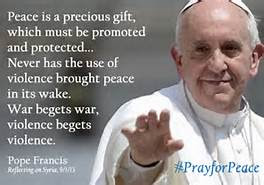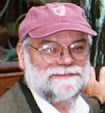To get to Mike's actual blog (and not my reprint), click here: http://mikerivageseul.wordpress.com/
I worked with Mike Rivage-Seul at Berea College from 1982-88. Mike is a former Catholic priest and was a professor at Berea College for some 30 years. Mike is a brilliant thinker and he matches his prophetic writings with action. Below is one of his most recent blog entries (here in the form of a homily). In a way, Mike is still a priest. I hope Mike doesn't mind that I've reprinted his blog entry here.
| Sunday Homily: It’s Time for Christians to Embrace Pope Francis’ ‘No to War!’by Mike Rivage-Seul's Blog |
Readings for 7th Sunday in Ordinary Time: LV 19: 1-2, 17-18; PS 103: 1-4, 8, 10, 12-13; I COR 3: 16-23; MT 5: 38-48. http://usccb.org/bible/
Like so many of you, I find it increasingly discouraging to read the daily news – and even more so to watch the shouting matches that pass for news coverage on television. The Koch brothers and the extreme right are on the ascendency. The disastrous Citizens United decision along with congressional gerrymandering, fraudulent voting machines, and voter suppression have all but insured that such ascendency will continue to the extreme detriment of democracy itself.
Where is the hope in all of this?
Where money is equated with free speech, where corporations are treated like persons [except they’re never put in jail (or dissolved) for breaking the law], where the powerful (like James Clapper) are immune from perjury charges (though they admit lying under oath), but those who tell the truth (like Edward Snowden) are identified as “enemies of the state,” where’s the hope?
How avoid despair in a country where those responsible for war crimes (like Donald Rumsfeld and Dick Cheney) brag about their crimes publicly and are rewarded on the lecture circuit or where a head of state like George Bush commits what the UN terms “the ultimate war crime” (waging a war of aggression) and avoids prosecution?
Two things: (1) remember history and (2) be awake to history’s counterparts manifesting themselves around us today. Just recalling the names associated with “lost causes” that ended up winning is inspiring. The short list includes Sojourner Truth, Elizabeth Cady Stanton, Mohandas Gandhi, Nelson Mandela, Martin Luther King. . . .
Their counterparts today? How about Amy Goodman, Noam Chomsky, Edward Snowden, Julian Assange, Pope Francis I. . . .
Of these, Pope Francis, it seems, holds the most hope for believers – and for the world. He is the leader of the world’s 1.2 billion Catholics. And when he says, “Never again war! War never again!” Catholics must take his words into account whether they agree or not. Even non-Catholics must do so because of the pope’s stature and since his uncompromising anti-war stance calls into question what Paul identifies in today’s second reading as “the wisdom of the world” – about the inevitability of war.
In fact, today’s readings all steer us away from such worldly wisdom. They point us instead towards the biblical tradition which understands God not as the vengeful warrior of competing biblical traditions, but as merciful and compassionate. As today’s Gospel reading reminds us, that merciful and compassionate understanding (and not its biblical opposite) was the understanding Jesus embraced. It’s the basis of his commandment that his followers’ way of life should mirror the perfection of God. It’s the foundation of indiscriminate love of neighbor and of the Christian pacifism pope Francis so courageously embodies.
To begin with, in today’s Gospel, Jesus takes pains to distinguish between the Bible’s warlike vengeful God and its Compassionate One. Jesus specifically rejects the one and endorses the other. For Matthew that rejection and endorsement was momentous – as significant as Moses reception of the Ten Commandments from his God, Yahweh. That’s why Matthew [in contrast to Luke’s equivalent “Sermon on the Plain” (LK 6:17-49)] has Jesus deliver his “sermon” on a mountain (5:1-7:27). The evangelist is implicitly comparing Moses on Mt. Sinai and Jesus on “the Mount.”
In any case, through a series of antitheses (“You have heard . .. but I say to you . . .”), Jesus contrasts his understanding of the Law with more traditional interpretations. The Mosaic Law demanded an eye for an eye and a tooth for a tooth, but Jesus’ Law commands:
• Turning the other cheek
• Going the extra mile
• Generosity with adversaries
• Open-handedness to beggars
• Lending without charging interest
• Love of enemies
• Going the extra mile
• Generosity with adversaries
• Open-handedness to beggars
• Lending without charging interest
• Love of enemies
Matthew concludes that if we want to be followers of Jesus, we must also be merciful and compassionate ourselves. As the reading from Leviticus says, we are called to be holy as God is holy. Or as Jesus puts it, perfect as God is perfect.
And how perfect is that? It’s the perfection of nature where the sun shines on good and bad alike – where rain falls on all fields regardless of who owns them. It’s the perfection of the God described in this morning’s responsorial. According to the psalmist, the Divine One pardons all placing an infinite distance (“as far as east is from west”) between sinners and their guilt. God heals all ills and as a loving parent is the very source of human goodness and compassion. That’s the perfection that Jesus’ followers are called to emulate.
All of that is contrasted with what Paul calls “the wisdom of the world” in today’s excerpt from his first letter to the Christian community in Corinth. The world regards turning the other cheek as weakness. Going the extra mile only invites exploitation. Generosity towards legal adversaries will lose you your case in court. Open-handedness towards beggars encourages laziness. Lending without interest is simply bad business. And loving one’s enemies is a recipe for military defeat and enslavement.
Yet Paul insists. And he bases his insistence on the conviction that we encounter God in every human individual whether they be our abusers, exploiters, or legal adversaries – whether they be beggars or debtors unlikely to repay our interest-free loans.
All of those people, Paul points out are “temples of God.” God dwells in each of them just as God does in us. In the end, that’s the basis of the command we heard in the Leviticus reading, “You shall love your neighbor as yourself.”
Normally, our self-centered culture interprets that dictum to mean: (1) we clearly love ourselves more above all; so (2) we should love our neighbors as much as we love ourselves.
But in the light of Paul’s mystical teaching that God dwells within every human being , the command about neighbor-love takes on much deeper implication. That is, Paul the mystic teaches that our deepest self is the very God who dwells within each of us as in the Temple. We should therefore love our neighbor (and our enemy, debtor, adversary, and those who beg and borrow from us) because God dwells within them -- because they ARE ourselves. They ARE us! To bomb them, to fight wars against them is therefore suicidal.
No wonder, then, that Paul threatens that God will destroy the person who fails to recognize others as temples of God and harms them. Paul means that by destroying others we inevitably destroy ourselves, because in the end, the God-Self dwelling within us is identical with the Self present in every human being. That is a very high mystical teaching. It should be the faith of those pretending to follow Jesus. It should make all of them (all of us!) pacifists.
If we owned that truth, that would be the end of wars. Imagine if the world’s 1.2 billion Roman Catholics simply refused to destroy their fellow human beings because they recognized in them the indwelling presence of God. Imagine if we stopped worshipping the God Jesus rejects – the “eye for an eye and tooth for a tooth” War God – and embraced Jesus’ compassionate and loving Parent God.
It’s up to us who do accept that recognition not to reject the Christian tradition which speaks so powerfully to so many. Rather we are called to take steps to rescue Jesus’ God from the war mongers and oppressors who have so distorted Jesus’ teaching as presented in this morning’s readings.
I suggest that means
• Returning to church.
• Embracing the “No to war” message of Francis I.
• Making it explicit that our “No” is a matter of faith denied only by those who have (in Paul’s terms) embraced the “wisdom of the world” which is foolishness in God’s eyes.
• Mobilizing our congregations accordingly.
• More particularly, organizing congregations (as a specific response to Pope Francis) to endorse the International Day of Peace (next September 21).
• Embracing the “No to war” message of Francis I.
• Making it explicit that our “No” is a matter of faith denied only by those who have (in Paul’s terms) embraced the “wisdom of the world” which is foolishness in God’s eyes.
• Mobilizing our congregations accordingly.
• More particularly, organizing congregations (as a specific response to Pope Francis) to endorse the International Day of Peace (next September 21).
Inspired by Pope Francis, it’s time to take the microphone away from Christian warmongers and to make Christian pacifism a mainstream movement. That's our best hope, I think, in the face of all those reasons for despair.
| Comment | See all comments |



No comments:
Post a Comment